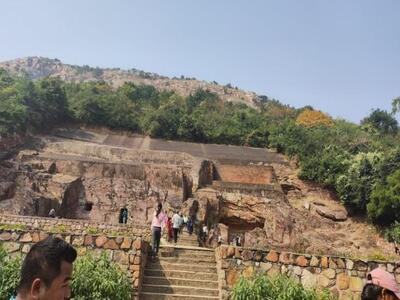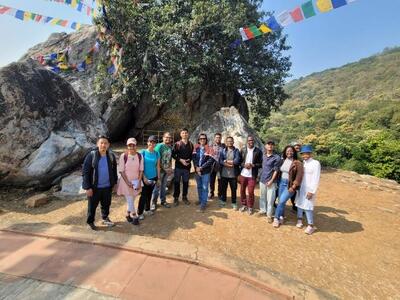List of events(Invited Lecture/Seminar/Conference/Field Trip: 2021 onwards)
January 29, 2024
1) Lecture on Mathematics in Ecology by Prof. V. Sundarpandiyan, Sept 2023.
2) Lecture by Prof. Ivan Jaric, Ecology and Conservation Culturomics; Emerging Fields in the age of the Internet. Speaker: Prof. Ivan Jaric, University of Paris, Saclay, France, 23 November 2023. (Online).

3) Field Activity: Plastic Waste Management in Nalanda University Campus
Date: 8-10 June 2023
Field study conducted by: Students of SEES, Nalanda University.
Supervised by: Prof. R Jaishanker Nair
Objectives: In line with the theme “Beat Plastic Pollution” of the World Environment Day 2023 celebration, the School of Ecology and Environment Studies (SEES), Nalanda University organized a plastic waste assessment field work within the campus during 8-10 June 2023 to reduce plastic waste.

Figure 1. SEES students with members of waste management & handling team.

Figure 2. Waste Management process inside the campus

Figure 3. Activities conducted as part of the World Environment Day by SEES students and types of different plastic waste generated inside the campus.
4) Field Activity: Field visit to Aquifer Recharge Pit at Nekpur and Meyar ,Ganga Water Lift Project And Reservoir ,Water Treatment Plant at Giriyak
Date: 29 April 2023
Field study conducted by: Students of SEES, Nalanda University.
Supervised by: Dr. Kishore Dhavala and Dr. Satyanarayan Shashtri.
Objectives: Field visit to Nekpur, Mahyanpour and Giriyak Dam on water conservation and rechcharge project with the students of Semester II.



Figure 1. Photographs related to the field visit.
5) Field Activity: Field Visit related to remote sensing and GIS study
Date: 20 November 2022
Field study conducted by: Students of SEES, Nalanda University.
Supervised by: Dr. Moonmoon Hiloidhari
Objectives: The objectives of the field trip were to collect LULC data of Rajgir area, to examine the landscape ecosystem and biodiversity of Rajgir Hills, to measure the elevation of the study area and to provide some GCP (Ground Control Points) for the provided Rajgir Toposheet with the help of GPS (Geographic Positioning System).






Figure 1. Some photographs of the field visit.
6) Field Activity:
Objective: To demonstrate how to collect ecological data on plant biodiversity in different vegetation types by laying sample plots and to study the environmental set up in disturbed and undisturbed areas, with following subobjectives:
- Finding homogenous forest stratum for data collection on flat and slopes
- Laying and marking of sample plots for Trees, shrubs and herbaceous plants.
- Identification of plants in the field by botanical and vernacular names.
- Making measurement of tree (diameter at breast height and height), shrubs and herbaceous plants to develop biodiversity indices.
Outcome of the fieldwork:
- First-day students located the homogenous strata of Sal forest on satellite data and tracked to the Sal forest through dense forest of the Ghorakotora forest range of Pant Wildlife Sancturay, Rajgir. The students learned how to navigate inside the forest using satellite data and GPS and revisit the plot laid in 2020 by SEES students.
- Students were briefed about the field procedures such as how to identify north direction, identify directions to lay new plot of 20×20 m for enumerating trees, 5×5 m for shrubs and 1×1 m for herbaceopus vegetation in Sal forest. They were denostrated about measurements tree girth at breast height (1.37 m).
- They were also explained how collect ancillary information such stand height, canopy cover, ground litter percentage, soil types, biotic interference, wildlife evidence, etc. All the tree were identified and listed. They were trained to find out slope and aspect using compass and clinometer. The students were divided into two groups and each faculty member supervised each team to collect data.
- A similar exercise was doned on the second day on Swarn Giri in mixed moist deciduous forest. The team climbed hill thought forests of dry deciduous scrub, dry deciduous forest and reached to mixed moist deciduous forest. While climbing on the hill, the students were explained to collect ground truth on the opposite hills and in the valley and identify land sue/land covers on satellite data, and study the tonal characertistic and impact of physiography. They learned botanical names of the plants enroute and their phenological behavious. The students got to learn about difference in biodiversity in disturbed homogenous Sal forest and undisturbed mixed moist deciduous forest. Analysis for quantification of biodiversity will be done by the students.




Fig1: Field photos of the SEES 2020-22 batch students during 5-6 March 2022.
7) Field activity:
Objective: To collect ground truth for mapping Vegetation Cover Types and Land Use /Land cover using different seasons satellite data.
The outcome of the fieldwork:
The students of the Semester (2021-23 batch) were taken for the field trip on November 19-20, 2021. First-day students tracked Vaibhargiri. The students learned about orientation and reading of the topo sheets, referencing system, scale variations and details on 1:50,000 and 1:250,000 scale, and legend information. From hill ridge, they were shown different features on Vaibhargiri, Vipulagiri, cultural features of Rajgir and surroundings, agricultural landscape. Next, they climbed some distance on Ratnagiri at two places and Songiri to study the vegetation and cultural features between Brahmakund-Vanganga, a valley between Vaibhargiri and Ratnagiri, the valley between Ratna Giri and Udaigiri on the way to Gridhikut, valley, and hills between Songiri and Udaigiri, south slopes of Songiri and Jethian valley. They were taken and shown various forest types (Bamboo, Dry Deciduous scrub, Dry Deciduous Forest, Sal Forst, Moist Deciduous Forest, grasslands, plantations (Teak, Cassia, Peltophorum, etc.), land use/land cover such as water bodies, agriculture area, barren soil and rocks, orchards, settlements, etc. They learned:
- how to orient the map to the north direction using a compass and referencing system of the maps for continuity of the features,
- how to identify and correlate various features and locate the current position on the map, transfer that location to satellite data and also use GPS,
- how to use primary and ancillary information to locate oneself on the ground.
- Identify the features on the ground and correlate the image characteristics, and make notes of these,
- why features occur at different locations, have different or similar image characteristics, so they explored reasons and spectral characteristics of the various features
- after initial understanding, the student volunteered to lead the team and reach the next destination to collect ground truth.


Fig 1: Field photos of the SEES 2021-23 batch students doing different activities in the field during 19-20 November 2021.
8) Field Activity:
Objective: Understanding solid waste management in Rajgir town, Bihar
The School of Ecology and Environment Studies organised a field trip for the 3rd-semester students to the Solid Waste Management centre located at Ashok Nagar, in the center of Rajgir City, Nalanda, Bihar as a part of our course on Life Cycle Assessment and Circular Economy on November 26th 2021, under the supervision of Dr. Kishore Dhavala and Dr. Moonmoon Hiloidhari. This facility started operating on 26th July 2017, previously located at Bhui, 10 km north of Rajgir. It was proposed to solve the solid waste problem, as it was becoming an emerging concern in a place that receives tourists worldwide.
The trip’s goal was to understand the Solid Waste Management situation in the city. The students were working in three different groups. Group A. focused on the creation and collection process of the solid waste in the facility. At the same time, Group B looked into Segregation and utilisation at the centre. And Group C was concerned about the functionings and Revenue generation of the centre. Each group had prepared a set of questionnaires under the guidance of Dr Kishore Dhavala in order to understand the present scenario of solid waste management in Rajgir.
The trip made the students aware of the current scenario of solid waste management in Rajgir. Waste Management teaches an important lesson in moving from a “Linear” to a “Circular” model of the economy in a time when achieving sustainability is necessary to survive and mitigate the biggest upcoming disaster “Climate change”. The students divulged into a deep discussion over the topic after the trip and all the three groups made separate reports with some recommendations for the centre. The trip helped students understand solid waste management in a rapidly urbanising city “Rajgir”.



9) Short Term Programme: Dr. Satyanarayan Shashtri conducted a Short Term Programme Certificate course on Geo-informatics online during April- May 2023.
10) Invited workshop/lecture/seminar/conference by SEES faculties
- Seed dormancy: classification, variation in space and time’ at Seed Functional Ecology Winter School 2023 & 2022, organized by International Society of Seed Science (ISSS) and University of Pavia, Italy from 23-27 Jan, 2023 & 24-28 Jan 2022. (Dr. Shyam S Phartyal).
- ‘Seed Ecology of Wetland Plants’ – Seed Talk Lecture Series of Seed Science Lab, Department of Botany, University of Peradeniya, SRI LANKA, delivered on 27 April 2022. (Dr. Shyam S Phartyal).
- Seed dormancy, germination and climate change’ at Online course on Ecosystem, Biodiversity and Climate Change, organized by Society for Environment and Development (SED India) & Sri Venkateswara College, University of Delhi, New Delhi from 12-14 March 2022. (Dr. Shyam S Phartyal).
- Invited as one of the panellists for panel discussion on ‘Citizen Science and Education’ CitSci India 2023 a fourth Annual National conference on ‘Citizen Science for Biodiversity’, an online meeting held from Dec. 1-2, 2023. (Dr. Shyam S Phartyal).
- Valuation of Wetland Ecosystem (2022) – BHU, “Ecosystem functioning in Anthropocene-ISEFA”. (Dr. Kishore K Dhavala).
- A Model for Insulating Climate Risks in Marine Fisheries with Insurance (2022)- BOBP-IGO, World Bank, CMFRI “International Symposium on Insulating Marine Fisheries Sector in South Asia from Uncertainties: Global Experiences with Insurance”. (Dr. Kishore K Dhavala).
- Statistical Modeling and Climate Variability (2023) – UAS Dharwad and IIT Dharwad to organize the Capacity Building Programme on “Advances in Managing Climate-Water-Food Nexus”. (Dr. Kishore K Dhavala).
- Environmental Valuation (2023) Kumaun University – UGC-Human Resource Development Centre, “Online Refresher Course in Environmental Studies. (Dr. Kishore K Dhavala).
- Valuation of Ecosystem Services and its Application in Ocean Accounting (2023) NCCR-MoES, GOI, “Stakeholder meeting on “Ecosystem Services and Accounting – Coringa Mangroves. (Dr. Kishore K Dhavala).
- Oral presentation (virtual) in the International Mountain Conference (IMC 2022), University of Innsbruck, Austria, 11th -15th September 2022. (Dr. Sayan Bhattacharya).
- Oral presentation (virtual) in the International Conference on Geo-diversity, Geo-heritage, Geo-tourism, Geo-education, Geo-parks & Sustainable Development Goals, Safi, Morocco, 21st-26th October, 2023.
- Oral presentation (virtual) in the International Conference on Environment and Society: Watershed processes in the face of dynamic landscape and climate change, Florida International University, United States, 22nd- 23rd November, 2021.
- Oral presentation (virtual) in the Annual Conference of International Society of Tropical Foresters, School of Environment, Yale University, 18th-20th February, 2021.
- Invited Guest Lecture (virtual) on “Environmental sustainability: the journey from blue marble to sustainable development goals” on the occasion of World Environment Day, 5th June 2022 celebrated at Amrita Vishwa Vidyapeetham, Combaitore, Tamil Nadu. (Dr. Moonmoon Hiloidhari).
- Invited as resource person to deliver a talk on Life Cycle Assessment on 18 May 2022 as part of the One Month Certificate Course on Environmental management (April 26th to May 25th, 2022) organized by University of Science and Technology Meghalaya (USTM) and Tezpur University. (Dr. Moonmoon Hiloidhari).